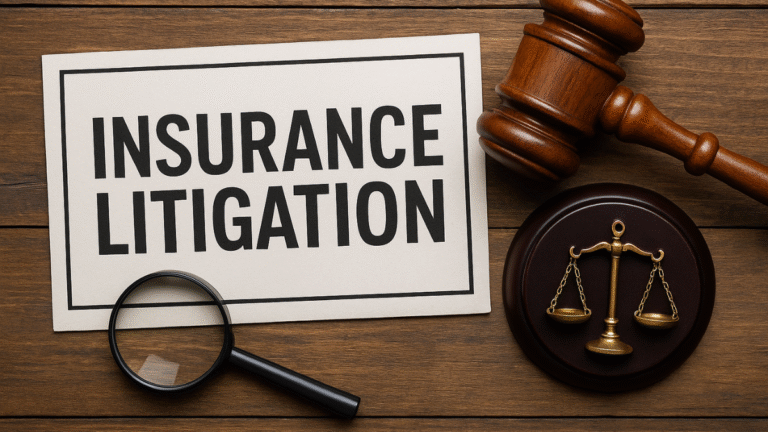Insurance is meant to provide peace of mind, offering financial protection during uncertain times. But what happens when your claim is denied or delayed unfairly? That’s where insurance litigation comes into play. For many policyholders, navigating this legal process can feel overwhelming. This comprehensive guide breaks down everything you need to know about insurance litigation — from its causes to your legal options and how to protect your rights as a policyholder.
What Is Insurance Litigation?
Definition and Overview
Insurance litigation refers to the legal process that occurs when disputes arise between an insurance policyholder and an insurance company. These disputes usually stem from denied, delayed, or underpaid claims. Litigation may be pursued when negotiations and appeals fail to resolve the issue.
Common Scenarios That Lead to Litigation
- Claim denial without valid reasons
- Delays in claim processing
- Partial or undervalued settlements
- Bad faith actions by the insurer
- Misrepresentation or ambiguous policy language
When these disputes cannot be resolved informally or through mediation, policyholders may resort to legal action.
Understanding Your Rights as a Policyholder
The Duty of Good Faith
Under insurance law, insurers have a legal obligation to act in good faith when handling claims. This means they must:
- Investigate claims thoroughly and promptly
- Communicate clearly and regularly with policyholders
- Offer reasonable explanations for denials
- Pay valid claims without unnecessary delays
If an insurer violates these duties, it can open the door for bad faith insurance litigation.
Your Legal Protections

Depending on your jurisdiction, consumer protection laws and insurance regulations may allow you to:
- Sue for contractual damages
- Claim punitive damages in bad faith cases
- Seek compensation for emotional distress or financial losses
- Recover legal fees
Understanding these rights is critical if you’re involved in a dispute with your insurance provider.
Common Types of Insurance Litigation
Health Insurance Disputes
These involve denial of medical procedures, surgeries, or prescription drugs. Many arise due to questions of medical necessity or network limitations.
Auto Insurance Disputes
Common in accident cases, these include disputes over fault determination, coverage limits, or delay in compensation.
Homeowners and Property Insurance Disputes
Often related to natural disasters, fires, or water damage, disagreements may focus on repair estimates or claim denials.
Life Insurance Disputes
Beneficiaries may face challenges when insurers deny payment due to alleged policy violations or misrepresentation during application.
Business Insurance Disputes
Companies may litigate over denied business interruption claims, liability coverage issues, or commercial property damage.
What Triggers Insurance Litigation?
1. Bad Faith Practices
An insurer acts in bad faith when it:
- Unreasonably denies or delays a valid claim
- Fails to conduct a proper investigation
- Misrepresents policy terms
- Pressures the policyholder into accepting a low settlement
2. Ambiguous Policy Language
Vague or confusing terms in the policy can lead to disagreements about coverage. Courts usually interpret such ambiguities in favor of the policyholder.
3. Disputes Over Coverage Limits
Some litigation arises when the insurer argues that the policy does not cover the full extent of the damages claimed.
4. Misrepresentation and Fraud Allegations
Insurers may claim that the policyholder misrepresented facts during the application process. This can result in claim denials and lead to litigation.
The Insurance Litigation Process Explained
Step 1: Claim Submission and Denial
It begins when you file a claim. If the insurer denies or delays it, you must first exhaust all internal appeals or complaint processes.
Step 2: Hiring an Attorney
An experienced insurance litigation attorney evaluates your claim, the denial letter, and your policy. They determine whether litigation is the best course of action.
Step 3: Filing a Lawsuit
Your attorney files a complaint in civil court against the insurer, outlining your legal grievances.
Step 4: Discovery Phase
Both parties exchange documents, conduct depositions, and gather evidence to build their cases.
Step 5: Settlement Negotiations
Many cases settle before trial. Your attorney may negotiate a fair payout based on the evidence.
Step 6: Trial and Verdict
If no settlement is reached, the case goes to trial. The judge (or jury) hears arguments and issues a verdict.
Do You Always Need to Go to Court?
Not necessarily. Alternative dispute resolution methods like mediation or arbitration can be faster and less expensive than litigation. These options can often resolve disputes without a formal court battle.
Tips for Policyholders Facing Litigation
1. Document Everything
Keep a record of all communication, claim documents, receipts, photos, and estimates.
2. Review Your Policy Thoroughly
Understand what is covered and what exclusions apply. Policy language is key to your case.
3. Be Proactive in Communication
Respond promptly to insurer inquiries and requests for documents. Stay informed throughout the process.
4. Don’t Settle Too Quickly
A quick settlement may not always be in your best interest. Consult your attorney before agreeing to any offer.
5. Know the Statute of Limitations
Each state has deadlines for filing lawsuits. Missing this window can cost you your right to sue.
The Role of the Attorney in Insurance Litigation
A skilled attorney can:
- Interpret complex policy language
- Determine whether bad faith has occurred
- Estimate the value of your losses
- Negotiate with the insurer
- Represent you in court
Choose an attorney with experience in insurance law and a history of successfully resolving such disputes.
Case Examples of Insurance Litigation
Example 1: Home Insurance Denial Post-Flood
A homeowner’s flood claim was denied based on an alleged lapse in premium payment. Litigation revealed that the insurer never sent a proper lapse notice. The court awarded the full claim amount plus interest and legal fees.
Example 2: Life Insurance Claim Dispute
A life insurance provider denied a $500,000 payout due to a minor omission in the policyholder’s medical history. The court ruled in favor of the beneficiary, stating the omission was not material to the coverage.
How to Prevent Insurance Litigation
1. Purchase the Right Coverage

Work with an advisor or agent to ensure you’re fully covered based on your lifestyle, health, and property risks.
2. Be Honest and Thorough
Disclose all relevant information when applying for insurance. Avoid exaggerating or hiding facts.
3. Understand the Policy
Read your policy and ask questions about anything unclear. Knowing your rights helps you make informed decisions.
4. Respond Promptly to Issues
If you receive a claim denial, act quickly. Delays can hurt your case.
5. Use Professional Help When Needed
A public adjuster or lawyer can help navigate complex claims before they escalate to litigation.
Also Read: What Is Insurance CRM?
Conclusion
Insurance litigation can be daunting, but understanding your rights and the process can significantly improve your chances of a favorable outcome. Whether it’s a denied health claim, a delayed home repair payout, or a disputed life insurance benefit, knowing when and how to escalate matters legally is essential. Always review your policy, document everything, and seek legal advice when necessary. With the right support, policyholders can stand up to unjust practices and obtain the compensation they’re rightfully owed.
FAQs
1. What is considered bad faith in insurance?
Bad faith occurs when an insurer unreasonably delays, denies, or underpays a valid claim or fails to investigate it properly.
2. How long does insurance litigation usually take?
The timeline varies. It could take a few months for settlements, or over a year if the case goes to trial.
3. Can I sue an insurance company without a lawyer?
Yes, but it’s not recommended. Insurance law is complex, and having legal representation significantly improves your chances of success.
4. Will my case go to trial if I sue my insurer?
Not always. Most insurance litigation cases settle out of court during pre-trial negotiations.
5. What damages can I recover in insurance litigation?
You may recover the original claim amount, legal fees, interest, emotional distress, and punitive damages in cases of bad faith.

